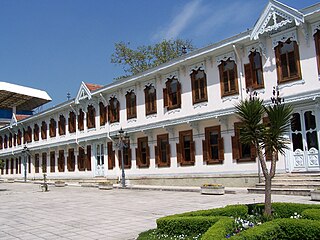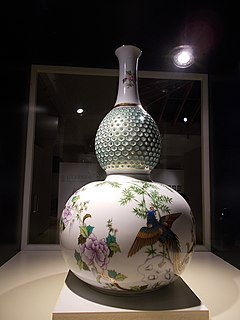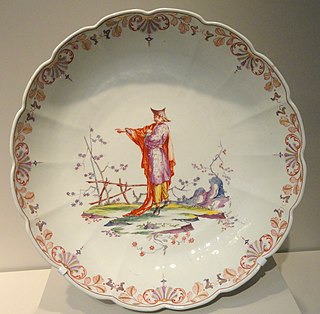
Porcelain is a ceramic material made by heating materials, generally including kaolin, in a kiln to temperatures between 1,200 and 1,400 °C. The toughness, strength, and translucence of porcelain, relative to other types of pottery, arises mainly from vitrification and the formation of the mineral mullite within the body at these high temperatures. Though definitions vary, porcelain can be divided into three main categories: hard-paste, soft-paste and bone china. The category that an object belongs to depends on the composition of the paste used to make the body of the porcelain object and the firing conditions.

Beşiktaş is a district and municipality of Istanbul, Turkey, located on the European shore of the Bosphorus strait. It is bordered on the north by Sarıyer and Şişli, on the west by Kağıthane and Şişli, on the south by Beyoğlu, and on the east by the Bosphorus. Directly across the Bosphorus is the district of Üsküdar.

Soft-paste porcelain is a type of ceramic material in pottery, usually accepted as a type of porcelain. It is weaker than "true" hard-paste porcelain, and does not require either the high firing temperatures or the special mineral ingredients needed for that. There are many types, using a range of materials. The material originated in the attempts by many European potters to replicate hard-paste Chinese export porcelain, especially in the 18th century, and the best versions match hard-paste in whiteness and translucency, but not in strength. But the look and feel of the material can be highly attractive, and it can take painted decoration very well.

Royal Worcester was established in 1751 and is believed to be the oldest or second oldest remaining English porcelain brand still in existence today. Part of the Portmeirion Group since 2009, Royal Worcester remains in the luxury tableware and giftware market, although production in Worcester itself has ended.

Dmitry Ivanovich Vinogradov was a Russian chemist who developed Russian hard-paste porcelain; he was the founder of the Imperial Porcelain Factory.

Chinese ceramics show a continuous development since pre-dynastic times and are one of the most significant forms of Chinese art and ceramics globally. The first pottery was made during the Palaeolithic era. Chinese ceramics range from construction materials such as bricks and tiles, to hand-built pottery vessels fired in bonfires or kilns, to the sophisticated Chinese porcelain wares made for the imperial court and for export. Porcelain was a Chinese invention and is so identified with China that it is still called "china" in everyday English usage.

Allach porcelain a.k.a. Porzellan Manufaktur Allach was produced in Germany between 1935 and 1945. After its first year of operation, the enterprise was run by the SS with forced labor provided by the Dachau concentration camp. The emphasis was on decorative ceramics —objects d'art for the Nazi regime. The company logo included stylized SS runes. Sometimes in place of the company name, the pottery markings mentioned the SS: "DES - WIRTSCHAFTS - VERWALTUNGSHAUPTAMTES".

Yıldız is a neighbourhood located in the Beşiktaş district of Istanbul, Turkey. The neighbourhood comprises some of Istanbul's well-known historical locations, such as Yıldız Park and Yıldız Palace, the second largest palace in Istanbul. Yıldız has a population of approximately 6,000.

Yıldız Palace is a vast complex of former imperial Ottoman pavilions and villas in Istanbul, Turkey, built in the 19th and early 20th centuries. It was used as a residence by the Sultan and his court in the late 19th century.
Mikhail Mikhailovich Adamovich (1884–1947) was a Russian decorative and monumental painter, and porcelain artist. He is known for his porcelain works with agitprop and Soviet art imagery.

Yıldız Park is a historical, urban park in Beşiktaş district of Istanbul, Turkey. It is one of the largest public parks in Istanbul. The park is located in Yıldız quarter between the palaces of Yıldız and Çırağan.

The Vienna Porcelain Manufactory Augarten is a porcelain manufactory located in Vienna, Austria.
Ayşegül Aldinç is a Turkish singer and actress.

The Herend Porcelain Manufactory is a Hungarian manufacturing company, specializing in luxury hand painted and gilded porcelain. Founded in 1826, it is based in the town of Herend near the city of Veszprém.

The Yıldız Hamidiye Mosque, also called the Yıldız Mosque, is an Ottoman imperial mosque located in Yıldız neighbourhood of Beşiktaş district in Istanbul, Turkey, on the way to Yıldız Palace. The mosque was commissioned by the Ottoman sultan Abdul Hamid II, and constructed between 1884 and 1886. The mosque was built on a rectangular plan and has one minaret. The architecture of the mosque is a combination of Neo-Gothic style and classical Ottoman motifs. A bronze colonnade erected by Abdul Hamid II in Marjeh Square of Damascus, Syria bears a replica statue of the Yıldız Mosque on top.

Yıldız Holding is a Turkish conglomerate that is best known for manufacturing food products. The company also produces other consumer goods and has its own retail, private equity and real estate operations.
This page is based on this
Wikipedia article Text is available under the
CC BY-SA 4.0 license; additional terms may apply.
Images, videos and audio are available under their respective licenses.
















